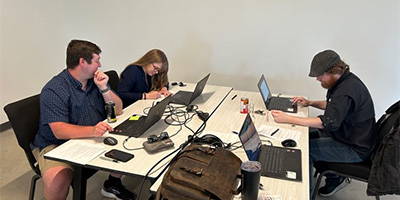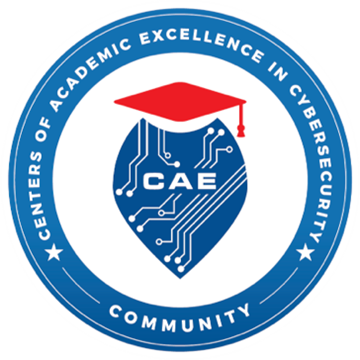The MCC Cybersecurity Center has been established to promote cyber-awareness to meet the growing need for a well-trained cybersecurity workforce. Through efforts directed at becoming a National Center of Academic Excellence in Cyber Defense Education, the MCC Cybersecurity Center has the following goals:
- Be a resource to promote (CAE-CD) programs, news, events and security awareness broadly.
- Provide high quality and rigorous (CAE-CD) programs designed to meet the needs of employers in the public and private sectors.
- Provide affordable and flexible (CAE-CD) education and training options that help promote student achievement, retention, completion and placement.
- Provide innovative, comprehensive and interdisciplinary education and training in the (CAE-CD) field.
- Continuously develop working relationship models for K-12 schools to engage students at an early age to enter (CAE-CD) fields of study. Develop and maintain articulation with four year institutions in the CAE framework.
- Continuously improve the quality of (CAE-CD) programs, curricula, faculty, students and sponsored relationships with industry and community partners.
Provide leadership and obtain sponsored research funding from both the National Science Foundation and National Security Agency in support of our CAE-CD efforts.
Study Cybersecurity at MCC
Students wishing to pursue careers in cybersecurity can earn stackable certificates into a Secure Systems Administration and Engineering (Cybersecurity) degree.
For additional information, we encourage you to speak with an Student Success Advisor and attend a cybersecurity information session.
Community engagement
Faculty and students of the program are always looking for ways to build community relations. As one example, Englewood Arts Center, in western Independence, MO requested MCC-Blue River’s expertise to help confront cyber security risks threatening community spaces.
A group of students in the cybersecurity program recently spent the afternoon in the arts center creating sustainable solutions to prevent Englewood Arts Center from being subject to a cyber-attack or accidentally sharing valuable customer and donor information.
They also created a plan of action for new hardware and software that could be added in the future. MCC-Blue River is grateful to partner with the Englewood Arts Center and will continue to support opportunities for community involvement and learning.


Faculty
The Secure Systems Administration and Engineering (Cybersecurity) program relies on high quality faculty for teaching and learning activities, maintaining curriculum, assessment, student development, and program management.
The faculty comes with years of industry experience, and many are still working in industry through full time, part time, or in consulting roles. Program faculty hold advanced degrees in information technology, cybersecurity, computer science, business, and other related fields.
Certifications held by program faculty include those from ISC2, CompTIA, Cisco, SANS, as well as other vendors.
Funding by the college, as well as through various grants, provides various opportunities for faculty to engage in continued professional development.
Advisory board
The Secure Systems Administration and Engineering (Cybersecurity) program relies on valuable input from a variety of stakeholders.
Each year, an advisory board convenes to discuss the current state of the program, accomplishments, industry trends, and opportunities for improvement. Advisory board members consist of stakeholders from the following groups:
- Practitioners from various industries and job roles
- Faculty and leadership from 4-year transfer schools
- Faculty and leadership from area high schools and career and tech centers
- Program alumni and current students
- Community members
- Faculty and leadership from MCC
-
Metropolitan Community College is committed to information security and the protection of student, employee and all other sensitive data.
Through efforts such as annual information security awareness training for all employees, additional focused training for specific job roles, maintaining updated policies and procedures, providing resources and offering training programs related to cybersecurity,
MCC has developed a culture where cybersecurity is a priority within the institution as well as academically. Following are some free resources related to security awareness:
-
MCC has maintains the following partnerships in an effort to provide rigorous programs with high quality curriculum that aligns with industry standards and certifications
- National Cybersecurity Training and Education Center (NCYTE) member
- CompTIA Authorized Academy partner
- VMware Academic partner
- KC Tech Council member
-
Students pursuing careers in cybersecurity have access to a variety of resources and are offered opportunities to engage with industry and employer partners in the following ways:
- Articulation and transfer agreements with area four year institutions.
- Campus visits from employer recruiters
- Employer site visits and tours
- Networking opportunities including social media groups
- Resume and job search resources including interview coaching
- Certification exam preparation workshops
- Access to extended open computing lab time
- Certified faculty with industry experience
- Access to faculty advising
- Regular course offerings with plans to complete degrees and certificates in two years or less
- Many courses available in evening, online and hybrid format
Students are also encouraged to join the cybersecurity club, the National Cybersecurity Student Association, as well as participate in cybersecurity competitions such as those offered through the National Cyber League.
-
- Professor Messer- CompTIA Security+ 601
- Science Direct - Find research publications
- Try Hack Me - A great way to expand on Linux and cyber security knowledge
